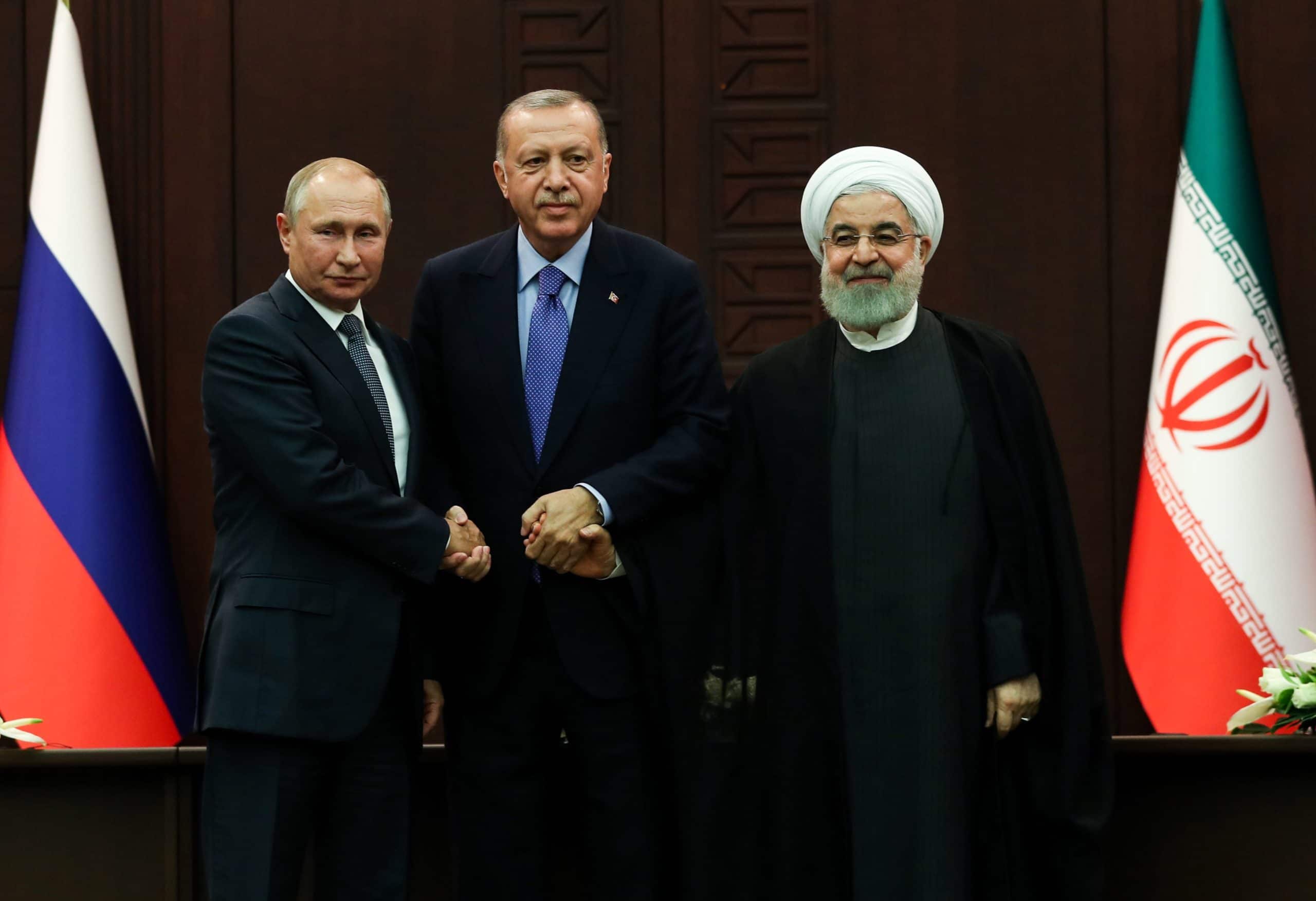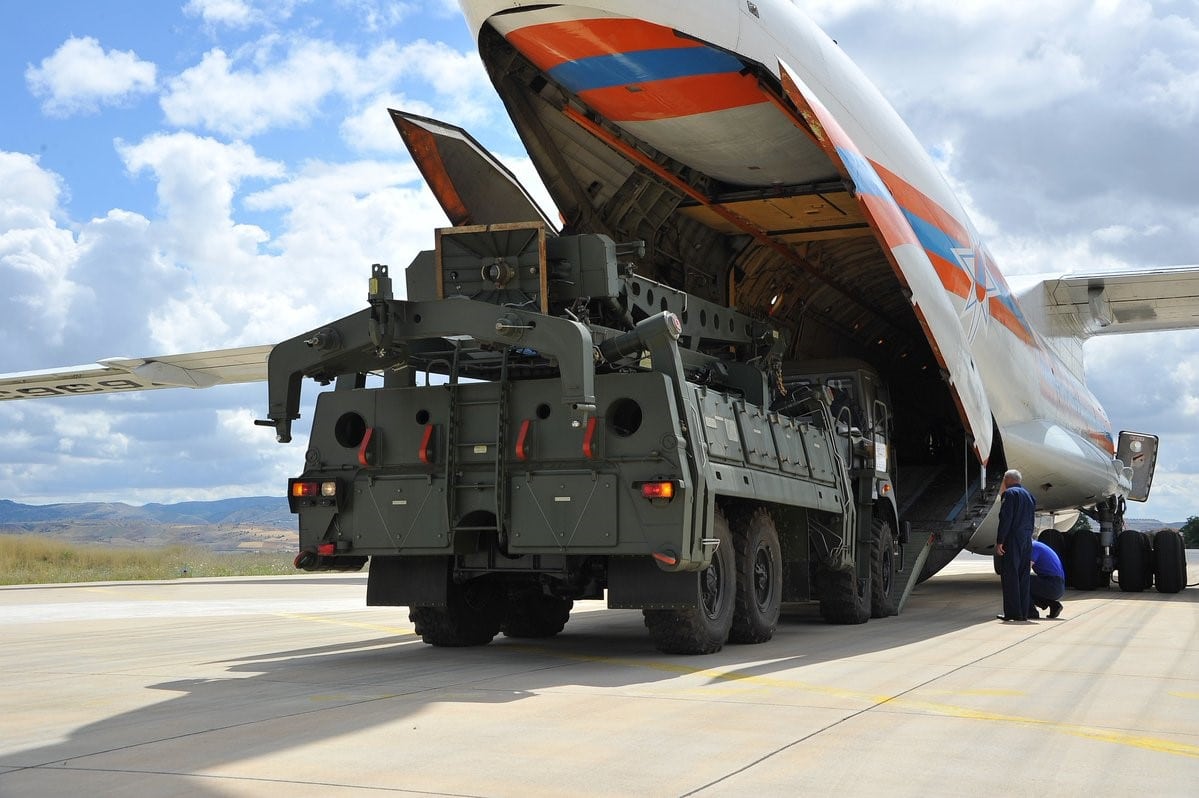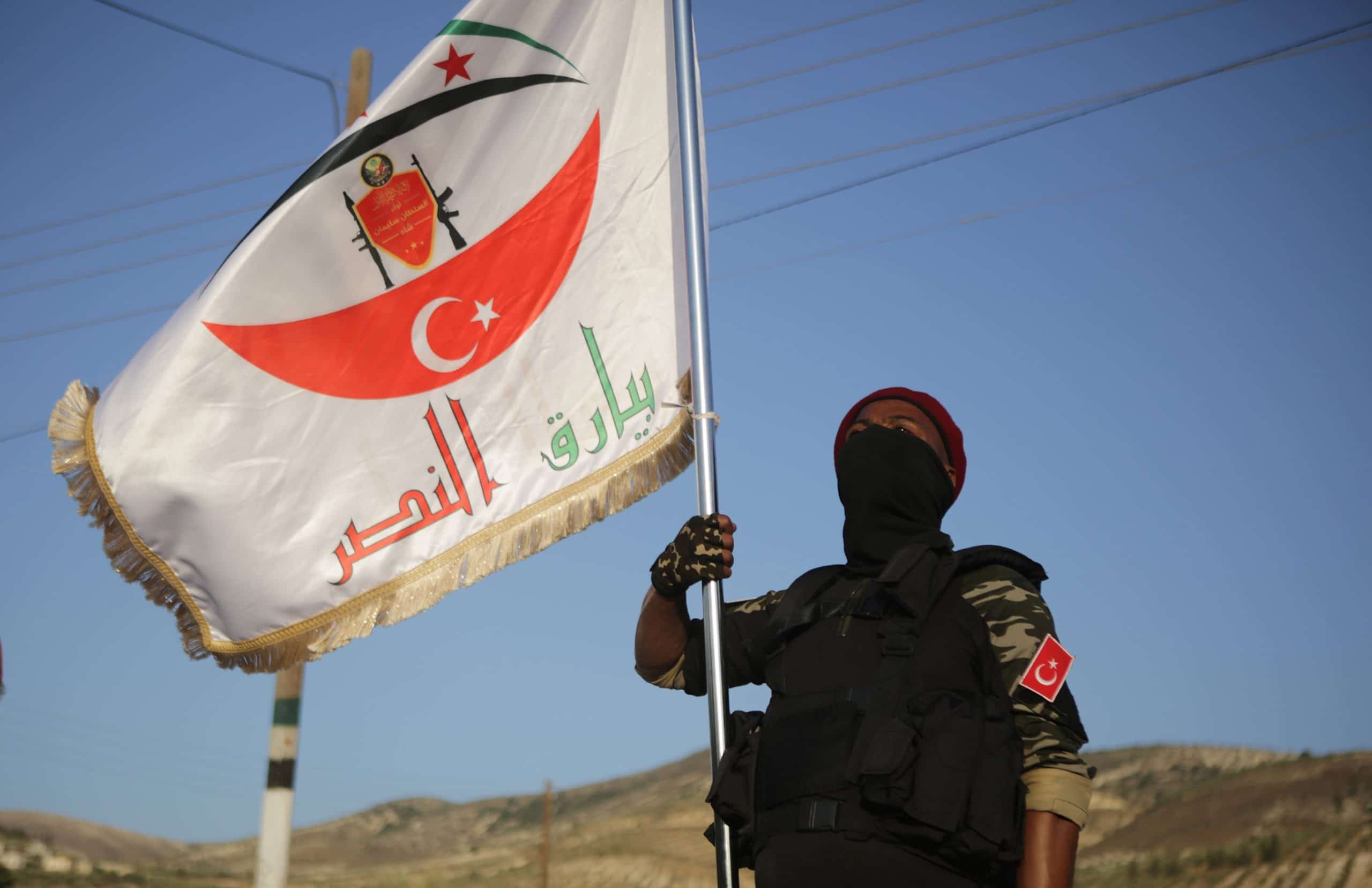January 14, 2021 | From Trump to Biden Monograph
Turkey
January 14, 2021 | From Trump to Biden Monograph
Turkey
Current Policy
The Trump administration inherited a relationship with Turkey that was already fracturing. Since his party’s ascent to power in 2002, Turkish President Recep Tayyip Erdogan has transformed his country from a Western-oriented secular republic into an authoritarian regime with a democratic façade. Erdogan’s Justice and Development Party has roots in the Muslim Brotherhood and thus harbors an anti-American and anti-Semitic worldview.1
Erdogan’s belligerence and irredentist ambitions have provoked or worsened conflicts with almost every one of Turkey’s neighbors. Since 2017, Ankara has also cooperated enthusiastically with U.S. adversaries such as Russia, Iran, and Venezuela, while serving as a sanctuary for Hamas and turning a blind eye to terror financiers associated with al-Qaeda and the Islamic State.2 Erdogan has deployed Turkish military and proxy forces across the Eastern Mediterranean and Middle East to challenge the United States, its NATO allies, and their regional partners. He has also taken U.S. citizens hostage as bargaining chips in negotiations with Washington. This pattern of hostility has set Ankara and Washington on a collision course.
Failing to recognize Erdogan’s deep-seated hostility, President Trump sought to mend the U.S.-Turkish relationship via frequent personal communication with Erdogan and expressions of solidarity. The two presidents, their in-laws, and their business associates have maintained close ties dating to the construction of Trump Towers Istanbul, which opened in 2012. These personal channels often displaced formal diplomatic mechanisms.3 Still, Trump occasionally pushed back against Erdogan via threats, short-lived sanctions, or other punitive measures, including tariffs and Treasury designations.

Turkish President Recep Tayyip Erdogan (C), Russian President Vladimir Putin (L), and Iranian President Hassan Rouhani (R) pose for photographs during a September 2019 press conference in Ankara following a trilateral meeting on Syria. (Photo by Adem Altan/AFP via Getty Images)
In 2017, at Erdogan’s behest, Trump sought to persuade the Department of Justice to drop the prosecution of Reza Zarrab, a Turkish-Iranian gold trader who orchestrated one of history’s largest sanctions-evasions schemes, which illicitly transferred tens of billions of dollars to Tehran. The prosecution went forward, however, leading Zarrab to plead guilty and implicate Erdogan.4
Turkish leaders sought to secure Zarrab’s release before the trial by borrowing the Iranian tactic of taking American citizens hostage, including a North Carolina pastor, a NASA scientist, and a chemistry professor.5 Trump seemed amenable to trading Zarrab for the pastor, Andrew Brunson, yet a congressional backlash ultimately led Trump to impose sanctions on two Turkish ministers, which secured Brunson’s release.6
Despite Zarrab’s plea and the related conviction of a senior executive at Halkbank, a state-run enterprise, the U.S. government has yet to fine the Turkish lender, whereas it imposed massive fines on European banks for similar offenses. The Department of Justice also pressured federal prosecutors to sign a non-prosecution agreement with Halkbank and grant immunity to suspects, which delayed the bank’s criminal prosecution until October 2019.
Adding to the tension, Erdogan sent Turkish troops into northeast Syria to attack the predominantly Kurdish Syrian Democratic Forces (SDF), a key U.S. ally in the campaign against the Islamic State.7
The Kurdish component of the SDF, the People’s Protection Units (YPG), grew out of the Kurdistan Workers’ Party (PKK), a U.S.-designated foreign terrorist organization that has fought the Turkish state for over 30 years. The YPG’s ties to the PKK are a cause of concern, yet Erdogan’s hostility also reflects his need to distract attention from his government’s corruption, economic failures, and suppression of dissent.
In both 2018 and 2019, Trump announced a full withdrawal of U.S. troops from Syria shortly after phone calls with Erdogan.8 Under pressure from both his own advisers and Republicans in Congress, Trump partially reversed his decisions, yet the October 2019 withdrawal order gave a de facto green light to Erdogan’s intervention, which entailed atrocities against civilians and enabled the return of Russian forces to northeast Syria.
Assessment
U.S. national interests suffered repeatedly over the past four years because of Trump’s personal relationships with autocrats such as Erdogan.
Erdogan’s unusual access to Trump only emboldened the Turkish leader, leaving him with the impression he could rely on his personal rapport with the president to provide him with a measure of impunity vis-à-vis Congress and U.S. law. Trump’s emphasis on interpersonal relations also encouraged Erdogan to pour millions of dollars into hiring Washington lobbyists to curry favor.9
The events of the past four years suggest that the most effective means of reversing Erdogan’s hostile courses of action – if only temporarily – is to threaten or employ punitive measures within the context of a coherent bilateral policy. When Trump demanded the unconditional release of Pastor Brunson and followed up with sanctions on two ministers, the Turkish justice system suddenly called off its farcical prosecution and set Brunson free. When the United States employed sanctions in response to Erdogan’s intervention in northeast Syria, the Turkish leader restricted the scope of his offensive.
Although Erdogan’s hostage diplomacy has waned, one of his prisons still holds Metin Topuz and Nazmi Mete Canturk, two Turkish nationals who worked at the U.S. Consulate General in Istanbul.10 The legal harassment of State Department employees continues to undermine the security and morale of U.S. consular workers abroad.11
While the prosecution of Halkbank is finally going forward, Trump reportedly negotiated with Erdogan to ensure a lenient fine, which has only encouraged further noncompliance.12 Since 2017, Turkey has become one of the key hubs for the sale of sanctioned Venezuelan gold and for the Maduro regime’s illicit finance network.13

A Russian Ilyushin Il-76 arrives at Murted Air Base in Ankara, Turkey, on July 12, 2019, delivering the first batch of equipment for the S-400 missile defense systems Turkey purchased from Russia. (Photo by Turkey’s National Defense Ministry/Handout/Anadou Agency/Getty Images)
Erdogan also exploited Trump’s permissiveness toward Ankara’s purchase of Russian military hardware in violation of the Countering America’s Adversaries Through Sanctions Act (CAATSA). The most high-profile violation of that law was Turkey’s purchase of the Russian S-400 surface-to-air missile system in 2017. Following Turkey’s receipt of its S-400 batteries in July 2019, the Trump administration imposed no sanctions but blocked the delivery of F-35 stealth fighter jets to Turkey and stopped training Turkish F-35 pilots.14 Unsatisfied, Congress added provisions to the annual defense authorization bill qualifying Turkey’s purchase of the S-400 air defense system as a “significant transaction” under CAATSA and requiring the president to sanction Ankara.15 Despite Trump’s threats to veto the bill, the House of Representatives and Senate passed the legislation with veto-proof majorities. Three days later, the Trump administration imposed CAATSA sanctions, introducing a ban on U.S. export licenses against Turkey’s defense procurement agency.16
With regard to the Eastern Mediterranean, Turkey’s aggression continues. Guided by the revisionist “Blue Homeland” doctrine, Ankara has explored for gas in waters claimed by Cyprus and Greece, deployed Islamist proxies to Libya, and coerced Tripoli into signing an accord that recognizes Turkish claims to Egyptian and Greek waters.17 Congress responded by authorizing an end to the U.S. arms embargo on Cyprus, which the secretary of state partially lifted shortly before visiting Nicosia in September.18 Congress also passed the bipartisan Eastern Mediterranean Security and Energy Partnership Act, mandating closer coordination with Cyprus, Greece, and Israel, and spurred the administration to take Erdogan’s provocations more seriously.19 Still, the administration was slow to mobilize a broader diplomatic coalition to show Erdogan that pursuing his irredentist claims will result in isolation.
Recommendations
- Support democracy and human rights in Turkey. Erdogan faces a vibrant democratic opposition that decisively won the last round of municipal elections. Washington should allocate additional resources for building the institutional capacity of Turkish civil society organizations and should issue Global Magnitsky sanctions on egregious violators of human rights. Washington should also continually raise the issue of Ankara’s mistreatment of its own citizens and relentless assault on their civil liberties.
- Resist Erdogan’s hostage diplomacy. Washington should pressure the Turkish president to release the two remaining U.S. consular employees and should deter Ankara from similar legal harassment of U.S. nationals and employees on frivolous terrorism and espionage charges. Washington should also work with NATO allies to devise a concerted response to counter the Erdogan government’s attempts to extract concessions by holding Western nationals and employees hostage.
- End political interference in the legal process against Halkbank so it can proceed on the merits. Treasury must follow up on the federal cases against Halkbank and its deputy general manager by imposing a fine proportionate to the underlying crimes. The prosecution of additional conspirators, as well as the designation of implicated Turkish officials, would also send a strong message.
- Pressure Ankara to abandon the sanctioned Russian hardware it received in July 2019, namely the S-400 air defense system. Washington should encourage Turkey to select a replacement built by NATO allies.
- U.S. authorities should strictly enforce CAATSA sanctions imposed in December, to prevent the Erdogan government’s attempts to exploit loopholes. Washington must keep Ankara out of the F-35 program to avoid the security risks posed by the potential co-location of the stealth fighters and the S-400 system. Washington must also accelerate the removal of Turkish entities from the F-35 supply chain.
- Deepen energy and security cooperation with allies and regional partners in the Eastern Mediterranean. The incoming administration should appoint a special envoy for the Eastern Mediterranean to work closely with the Eastern Mediterranean Gas Forum as a counterweight to Erdogan’s disruptive policies.
- Work with the European Union to devise coordinated sanctions against Turkey’s violations of its neighbors’ maritime borders. Such sanctions could help discourage Ankara from escalating tensions in the Eastern Mediterranean and derailing ongoing energy projects. Washington should also facilitate diplomatic talks between Turkey and its neighbors and provide incentives for Ankara to join the ongoing energy cooperation in the Eastern Mediterranean.
- Encourage Turkey to pursue the Kurdish peace process. The United States should work with its European partners and use transatlantic leverage over Ankara as well as the PKK and its affiliates to facilitate the Kurdish peace process within Turkey.

Factions of the Turkish-backed Free Syrian Army, the Hamza Division and the Suleyman Shah Brigade, which took part in Turkey’s Euphrates Shield and Olive Branch military operations in northwestern Syria, attend an exercise at a military training area in Aleppo, Syria, on October 5, 2019. (Photo by Bekir Kasim/Anadolu Agency via Getty Images)
- Help find a modus vivendi between Turkey and the Syrian Kurds. Washington should facilitate further talks between the YPG’s political wing, the Democratic Union Party, and the pro-Kurdistan Regional Government Kurdish National Council to strengthen relations between Syrian and Iraqi Kurds, which would also help build confidence with Ankara. Such an approach would enable Syrian Kurdish forces to remain focused on preventing an ISIS resurgence and would remove incentives for Erdogan to court the Assad regime as a partner against the Syrian Kurds. This approach would also help reverse Ankara’s growing diplomatic and military coordination of its Syria policy with Russia.
- Address corruption and strengthen the rule of law in Turkey by making U.S. economic support contingent on Turkish domestic reforms. Washington should avoid funding Erdogan’s reckless economic policies by offering a swap deal between the Federal Reserve and Turkey’s central bank or by providing funds from the U.S. Treasury’s Exchange Stabilization Fund. Instead, the incoming administration should urge Ankara to sign an Extended Fund Facility with the International Monetary Fund, preconditioned on good governance, thereby requiring the Turkish government to undertake reforms to improve Turkey’s accountability, transparency, and commitment to the rule of law.
